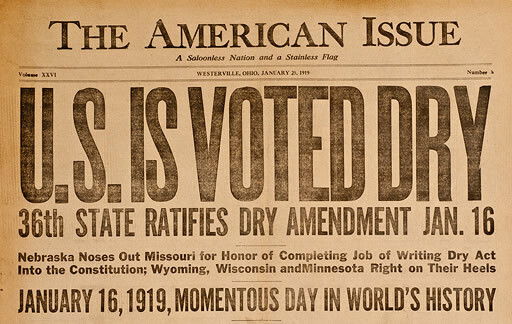The amendment terms caused the country to go dry on January 17, 1920.
The legal prevention of the manufacture, sale, and transportation of intoxicating liquors in the United States from 1920 to 1933 under the terms of the Eighteenth Amendment is known as Prohibition.

This also led to the passing of the Volstead Act. The Temperance Movement received massive support from the people and that's how Prohibition came into force.
However, a large portion of Americans were eager to drink and that's why the illegal sales of alcohol, led to the unlawful manufacturing and production of alcohol known as bootlegging. As a result of this, illegal drinking spots were also established.
This gave birth to many crimes and criminals. Hence, the Prohibition era is also known as the era of gangsterism.
What Led To The Prohibition
National prohibition of alcohol, also known as the Noble Experiment was initiated to cut down crimes, corruption, social issues, prison and poorhouse taxes, and to improve health and hygiene in the United States.
The first attempt to ban alcoholic beverages in the United States began in the 19th century. This movement was led by Protestants who aimed to cure problems like abuse, domestic violence, corruption, etc that they thought were caused due to alcoholism.
A series of prohibition laws were enforced that also cause major debate among the people. The group of people that supported prohibition were called 'drys'. They termed it a battle of morale and health.
The Result Of Prohibition
However, Prohibition did not fetch many results for the country. It was also stated as a big failure. The consumption of alcohol decreased by a significant amount in the beginning, but it kept increasing rapidly later on.
The anti-Prohibition forces got a stronger hand in Congress as the demand for revenues kept increasing during the Great Depression. This was the major reason for the demise of Prohibition.
The Cullen-Harrison act was signed by President Franklin Roosevelt which was an amendment to the Volstead Act on March 22, 1933, that allowed them to manufacture beer and wine on December 5, 1933, the 21st Amendment.